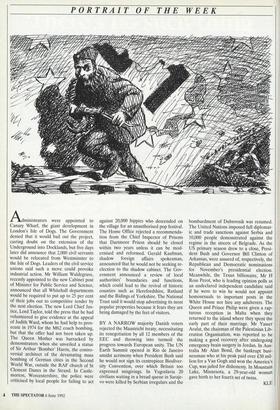PORTRAIT OF THE WEEK
Administrators were appointed to Canary Wharf, the giant development in London's Isle of Dogs. The Government denied that it would bail out the project, casting doubt on the extension of the Underground into Docklands, but five days later did announce that 2,000 civil servants would be relocated from Westminster to the Isle of Dogs. Leaders of the civil service unions said such a move could provoke industrial action. Mr William Waldegrave, recently appointed to the new Cabinet post of Minister for Public Service and Science, announced that all Whitehall departments would be required to put up to 25 per cent of their jobs out to competitive tender by the next election. The new Lord Chief Jus- tice, Lord Taylor, told the press that he had volunteered to give evidence at the appeal of Judith Ward, whom he had help to pros- ecute in 1974 for the M62 coach bombing, but that the offer had not been taken up. The Queen Mother was barracked by demonstrators when she unveiled a statue of Sir Arthur `Bomber' Harris, the contro- versial architect of the devastating mass bombing of German cities in the Second World War, outside the RAF church of St Clement Danes in the Strand. In Castle- morton, Worcestershire, the police were criticised by local people for failing to act
against 20,000 hippies who descended on the village for an unauthorised pop festival. The Home Office rejected a recommenda- tion from the Chief Inspector of Prisons that Dartmoor Prison should be closed within two years unless it can be mod- ernised and reformed. Gerald Kaufman, shadow foreign affairs spokesman, announced that he would not be seeking re- election to the shadow cabinet. The Gov- ernment announced a review of local authorities' boundaries and functions, which could lead to the revival of historic counties such as Herefordshire, Rutland and the Ridings of Yorkshire. The National Trust said it would stop advertising its most popular properties because it fears they are being damaged by the feet of visitors.
BY A NARROW majority Danish voters rejected the Maastricht treaty, necessitating its renegotiation by all 12 members of the EEC and throwing into turmoil the progress towards European unity. The UN Earth Summit opened in Rio de Janeiro amidst acrimony when President Bush said he would not sign its centrepiece Biodiver- sity Convention, over which Britain too expressed misgivings. In Yugoslavia 20 civilians waiting in a bread queue in Saraje- vo were killed by Serbian irregulars and the bombardment of Dubrovnik was resumed. The United Nations imposed full diplomat- ic and trade sanctions against Serbia and 10,000 people demonstrated against the regime in the streets of Belgrade. As the US primary season drew to a close, Presi- dent Bush and Governor Bill Clinton of Arkansas, were assured of, respectively, the Republican and Democratic nominations for November's presidential election. Meanwhile, the Texan billionaire, Mr H Ross Perot, who is leading opinion polls as an undeclared independent candidate said if he were to win he would not appoint homosexuals to important posts in the White House nor hire any adulterers. The Queen and Prince Philip were given a rap- turous reception in Malta when they returned to the island where they spent the early part of their marriage. Mr Yasser Arafat, the chairman of the Palestinian Lib- eration Organisation, was reported to be making a good recovery after undergoing emergency brain surgery in Jordan. In Aus- tralia Mr Alan Bond, the bankrupt busi- nessman who at his peak paid over £30 mil- lion for a Van Gogh and won the America's Cup, was jailed for dishonesty. In Mountain Lake, Minnesota, a 29-year-old woman gave birth to her fourth set of twins.
KLE


































































 Previous page
Previous page